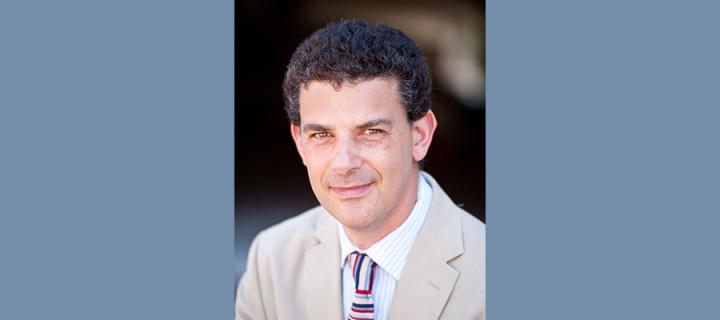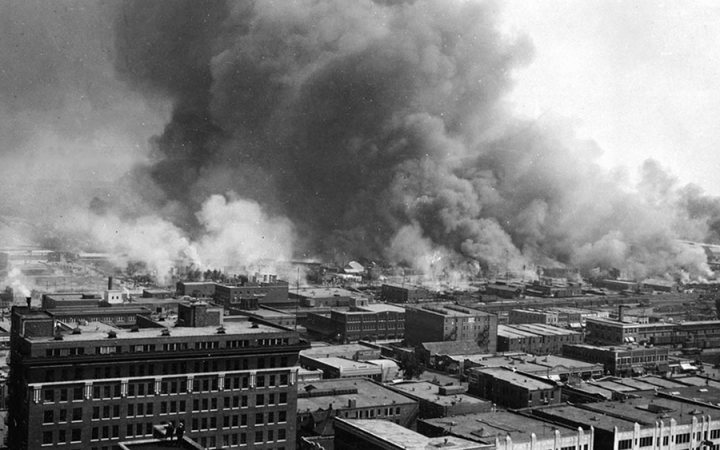Challenging racial injustices
Law graduate Eric J Miller on investigating race and the law, and his desire to expose and challenge racial injustice.

On 19 June 2019, law graduate Eric J Miller (LLB 1991) testified before the United States House Judiciary Committee's Subcommittee on the Constitution, Civil Rights, and Civil Liberties.
Drawing on his work with a team of lawyers seeking reparations for the victims and descendants of a race massacre that occured in Tulsa, Oklahoma, in 1921, the Loyola Law School professor made the case for HR40 - a bill to study the feasibility of reparations for the wrongs of slavery and segregation - and the Path to Restorative Justice.
Here Professor Miller retraces his career and reveals what drives him.
Who or what sparked your interest in law?
I was an avid debater at school, winning the Bank of Scotland Schools Debating Championship run by the Edinburgh University Debates Committee. I thought that becoming a lawyer would enable me to keep doing the things I really enjoyed: writing, reading, and debating.
Tell us about your time at the University – what memories stand out and why?
Moving away from my home in Glasgow, even though only across the country, was really important for me to explore various aspects of my identity that had been taken for granted in Glasgow. Socially, I was an avid participant in the debating society. I eventually became the national organizer of the Schools Debating Championship in my penultimate year at Edinburgh. I really liked our schools debating workshops, when we would go to schools that were new to debating and to teach debating and encourage the students to participate in the competition.
Academically, I particularly liked jurisprudence seminars with Neil MacCormick, who always managed to make the students’ comments appear cleverer than they were. John Cairns was exceptionally kind and supportive, and helped me through a rough patch. And Beverly Brown was also wonderful. Her seminar on Sexuality, Gender, and the Law set me on course for a lot of my future academic work, as did MacCormick’s jurisprudence seminars.
Has anything surprised you about how your life and career has played out so far?
At Edinburgh, I’d planned to pursue a career in jurisprudence. I had imagined when I graduated that I would end up teaching in Britain. I never thought I would clerk for a couple of US judges, and certainly not in Montgomery, Alabama, where I spent a year clerking for a District Court judge. Then, I initially thought I would specialize in civil rights law, which to some extent I do. But I eventually became interested in criminal law, criminal procedure, and criminal evidence—none of which were my strengths at Edinburgh—and ended up teaching those courses.
Your research pays particular attention to problem-solving courts, race and the law, and policing. What drew you to these areas?
My first big interest, after jurisprudence, was race and the law. I am of Afro-Caribbean descent—I used to describe myself as Afro-Caledonian. At Edinburgh, I’d studied gender, sexuality, and the law, but I really wanted to study the ways in which the law impacts race, and race impacts the law. So when I went to Harvard for my LLM, I studied race and the law. I quickly became a big fan of Critical Race Theory, which asks how the law has contributed to been creating maintaining a regime of subordinating people of colour in the United States. Its basic insight is that racism is a structural feature of our institutions, rather than the individual attitude of a few bad apples. Critical Race Theory enabled me to articulate a variety of ways of understanding my identity both in the United States and in the United Kingdom. That perspective remains a major influence on my scholarship.
When I was a Charles Hamilton Houston Fellow at Harvard Law School, I wanted to write about something that might combine my interest in jurisprudence, sociology, and criminal law. I thought problem-solving courts fit the bill. These are low-level criminal courts that deal with certain types of offenders—drug addicts, people with mental illness, and so on—and try to treat their addiction or illness as a way of treating the causes of their criminality. The judges generally eschew traditional rules of criminal procedure, and wield a lot of discretion in bringing what they describe as a treatment-oriented perspective to modify the behaviour of addicted offenders. I thought they would make an interesting subject to write about, one that could combine all my academic interests in crime, jurisprudence, and race.
I teach courses on the law that regulates the police in the United States, and thought I should write about what I was teaching. I also recognized that some of the most important issues of racial justice in the United States revolve around policing. So it seemed natural to write about issues that were both part of what I was teaching, but also deeply important for race politics in the United States.
Tell us about your work on seeking reparations for the victims and descendants of the Tulsa Race Massacre in 1921.

In 2003, I joined the Reparations Coordinating Committee, a group of lawyers seeking to file reparations lawsuits. I spent the first few months developing a legal strategy suggesting that we find a suitable case from the era of state-mandated racial segregation (1896-1968). As luck would have it, one of the Committee lawyers, Professor Charles Ogletree, discovered that the State of Oklahoma had recently completed a report on a race massacre, committed in 1921 by the City of Tulsa police and State of Oklahoma national guard, and that some of the survivors wanted to meet with him to discuss a lawsuit.
I helped draft a complaint based on the report, which we filed in federal court in 2003, representing about 125 still living survivors of the massacre.
Some historical context is in order. On May 30, 1921, white citizens of Tulsa, Oklahoma, deputized by the police and aided by the state national guard, burned down the thirty-five city blocks of Greenwood, a thriving African American residential and business district in the city. Up to three-hundred African Americans died in the massacre and ensuing fire. Overnight, five thousand African Americans became homeless. Three thousand terrorized people fled the city. The rest were rounded up and held under guard for days at the local baseball park and fairground. The Red Cross had to mobilize to provide tents for the thousands who remained.
In 2003, a Commission of historians, lawyers, and activists, formed by the State of Oklahoma reported on the massacre. The commission apportioned financial damages, and proposed that reparations be paid to the survivors and descendants. When the state refused to make good on those recommendations, we filed a lawsuit trying to complete the process begun by the Commission. The only impediment to our success, the courts acknowledged, was a rule requiring the survivors to file any lawsuit within two years of the massacre. These statutes of limitations are the major obstacle to many reparations lawsuits.
What can institutions that have benefitted from historical race-targeted exploitation do as a step towards restorative justice?
Given the number and diversity of institutions that have discriminated against African Americans, the ways in which different institutions can engage in restorative justice are quite varied. To give some examples: the United States federal government engaged in discriminatory mortgage loans that prevented African Americans buying houses in white suburbs throughout the 1940s and 1950s. At the same time, the federal government denied to African American farmers the sort of credit that was freely available to white farmers. Some of these discriminatory policies lasted through the 1980s. The result has been a massive disparity in home ownership between whites and African Americans in the United States, and the loss of billions of dollars worth of farming property. Certainly, the federal government could support programs to promote black home ownership and compensate discriminated-against communities; as well as programs to support and compensate African American farmers.
Finally, what motivates you?
I have been motivated for most of my life, in Scotland and in the United States, by a desire to expose and challenge racial injustice. My grandfather was a Jamaican who moved to Glasgow in 1915, and he and my father and my sisters and I have experienced discrimination in all sorts of ways. Reparations is one way to fight discrimination, by showing how deeply embedded it is in the social fabric of America—but not only America.

